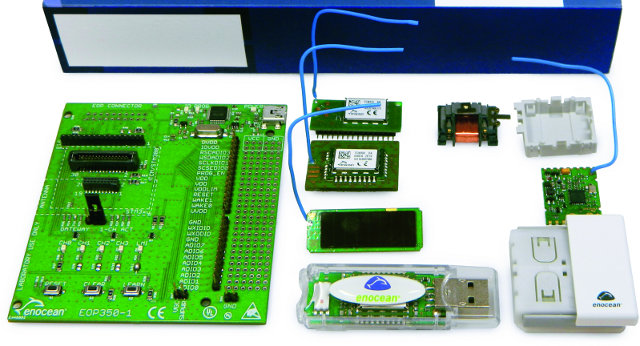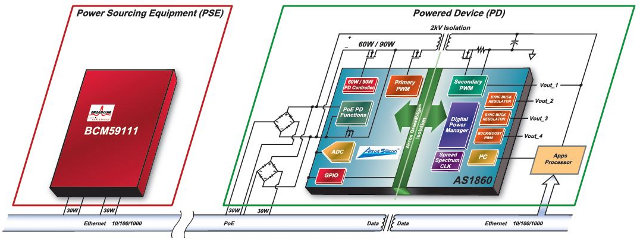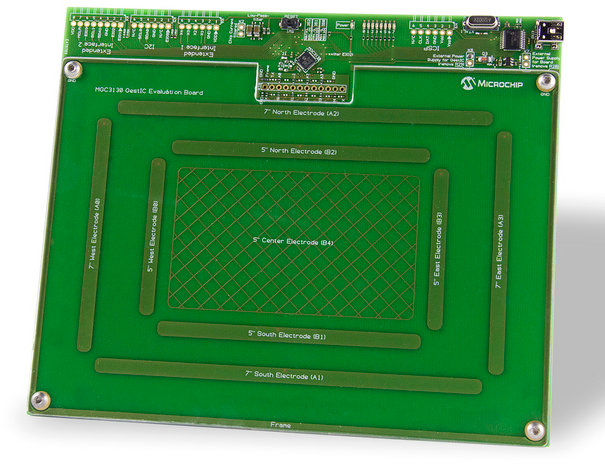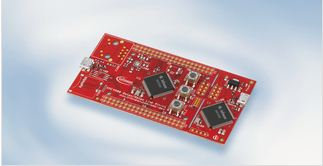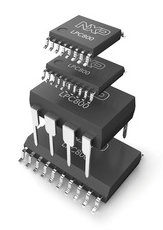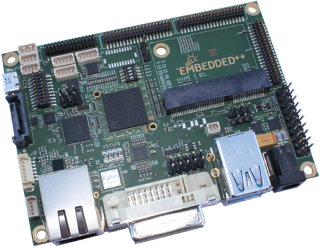EnOcean unveiled the EDK 350 developer kit which includes energy harvesting and wireless (RF) modules, and demonstrated the platform at Electronica 2012 on Future Electronics and Farnell booth. The new kit can help OEMs design batteryless applications quickly in a cost-effective manner for building and industry automation, smart homes and machine-to-machine systems. EnOcean EDK 350 Developer Kit includes the following modules: A universal programmer board (EOP 350) TCM 320 (transceiver module) STM 300 (universal wireless sensor module) ECO 200 (mechanical energy converter) PTM 330 (transmitter module for ECO 200) PTM 210/PTM 215 (energy harvesting switch module, PTM 215 includes data encryption function) STM 330 (energy harvesting temperature sensor module) USB 300 (USB wireless gateway) Wireless modules are normally available at frequencies of 315 MHz (for North America and countries following FCC specs) and 868 Mhz (for Europe and countries following R&TTE specs). The EDK 350 developer kit can be extended with […]
Akros Silicon AS1860 PoE Chipset Delivers 60-90W To Power Laptops, Thin Clients, IPTV…
Akros Silicon has just announced the availability of the AS1860, the latest SoC energy management IC of the company’s GreenEdge family. The AS1860 SoC and provide 60W and above (up to 90W) of power via Ethernet (PoE) to Powered Device (PD) applications such as thin clients, monitors, industrial Ethernet, IPTV, building management, Industrial Networking and many other high power designs. The company has showcased their solution at Electronica 2012, using a demo with a power sourcing equipment featuring Broadcom BCM59111 which can power up to 64 devices (4 per BCM59111 IC, but they can be cascaded to power 64 nodes) and a powered device (laptop) featuring their AS1860 chipset. The AS1860 SoC offers the following key features: Two chip solution (AS1860 SoC + one external FET) achieving dynamic power-level adjustment (to 60W and above) without using optocouplers and their associated complex compensation networks Higher power conversion efficiency due to communication […]
Microchip Announces MGC3130 3D Gesture Controller Featuring GestIC Technology
Microchip Technology has recently announced the MGC3130, the world’s first electrical-field (E-field)-based 3D gesture controller based on Microchip’s patented GestIC. This technology allows you to use hand gestures to control a computer with the accuracy of a mouse. The end result looks somewhat similar to what is done with the Leap Motion controller but the range is shorter as you need to be within 15cm of the surface with the electrodes. However, I would suspect this technology to be cheaper and consume less power. The picture above is the development kit with MGC3130 chipset at the top center of the board. With a power consumption as low as 150 microwatts in active sensing state, the MGC3130 enables always-on 3D gesture recognition (even for battery powered devices). The power consumption is up to 90% lower than camera-based gesture systems. Here are MGC3130 key features: 0 (touch) to 15 cm detection range […]
Infineon Unveils Low Cost XMC4500 Relax & Relax Lite Kits For Cortex M4 XMC4500 MCUs
Infineon XMC4500 micro-controller family is based on ARM Cortex-M4 core @ 120 MHz, comes with 128 to 160 KB SRAM, 512 KB to 1 MB “Program Memory” as well as interfaces & peripherals, such as DMA, Ethernet, USB, ADC, DAC, SPI, I2C, I2S, UART and more. They are specifically designed for industrial applications supporting temperatures up to 125°C. The family was announced at Embedded World 2012 in February, and mass production started in May. This week at Electronica 2012, the company announced two low cost development kits for XMC4500 MCU: XMC4500 Relax Lite Kit (10 Euros): XMC4500 Microcontroller (ARM® Cortex™-M4F based) Detachable on-board debugger Power over USB ESD and reverse current protection 2 x user button and 2 x user LED 4 x SPI-Master, 3x I2C, 3 x I2S, 3 x UART, 2 x CAN, 17 x ADC (12 bit), 2 x DAC, 31x PMW mapped on 2 Pin Headers […]
Kontron ULP-COM-sAMX6i – Freescale i.MX6 Solo, Dual and Quad Computers on Module
Freescale i.MX6 series was first announced in January 2011, and there have been delays due to problem with the silicon, but now the i.MX6 processors are finally in mass production, and lots of different products are using this SoC. The latest product I found is ULP-COM-sAMX6i by Kontron which is a series of computers on module based on ULP-COM (Ultra Low Power) standard featuring Freescale i.MX6 solo, dual and quad processors. Those commercial and industrial grade modules target markets such as transportation, medical and military. Here are the technical specifications of the modules: CPU – Freescale i.MX 6 Single, Dual and Quad Core ARM Cortex-A9 @ 800 MHz (Industrial grade), 1 GHz and 1.2 GHz System Memory – Up to 2 GB DDR3 Storage – Optional onBoard NAND/eMMC up to 64GB Graphics / Video – Dual Display, HD 1080p Decode/Encode and 2D/3D acceleration Video Output Resolution Parallel LCD 18/24 bit […]
NXP Launches Cortex M0+ LPC800 MCU and $15 LPC812-LPCXpresso Board
Following ARM Cortex M0+ announcement in March 2012, NXP Semiconductors has just announced the LPC800, tiny 32-bit MCUs based on Cortex M0+ core @ 30 MHz designed to replace 8-bit MCUs, together with LPCXpresso development board for the LPC800. The MCUs come with 1 to 4KB SRAM, 4 to 16 KB Flash, several serial interfaces and are available in SO20, TSSOP20, TSSOP16 and even DIP8 packages. Here are the key features of NXP new ultra low power 32-bit MCU family: ARM Cortex-M0+processor up to 30 MHz, software compatible with Cortex M0, M3 and M4 cores Memories: 4 to 16 kB Flash (with 64 Byte page size) 1 to 4 kB SRAM Serial Peripherals: Up to 3 USART interfaces Up to 2 SPI controllers 1x I2C-bus interface Timers: Multiple-channel multi-rate timer (MRT) State Configurable Timer (SCT) Self Wake-up Timer (WKT) clocked from either the IRC or a low-power clock source Windowed […]
Texas Instruments OMAP 5 Cortex A15 Systems-on-Module Galore
Today Texas Instruments published a press release to announce partners 6 company had worked to design and manufactures systems-on-module based on the dual core Cortex A15 OMAP 5 SoC and that those would be on display at Electronica Trade Faire this week (13-16 October) in Munich. Embedded++ EPP-Pico-OMAP5430 This solution is actually a Pico-ITX board based on OMAP5430 with 2 GB LP-DDR2, USB 3.0 SuperSpeed connectivity (1x USB 3.0, 3x USB 2.0), up to 16 GB eMMC storage, a SATA port, a 100Mb Ethernet port , UART, RS-323 & SPI ports, GPIOs, DVI and LVDS outputs, a serial camera input port, a micro SD card socket, Murata WiLink 8.0 connectivity solution (Wi-Fi, GNSS, Bluetooth®, Bluetooth v4.0 and FM technologies) and a built-in battery charger (1-cell Li-Ion). The company provides Linux and Android 4.1 BSP. Check the product page for a few more details. GreenBase GK-5432 GK-5432 is a computer on […]


